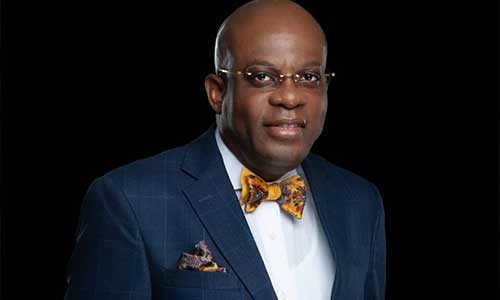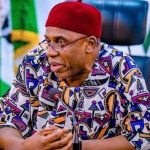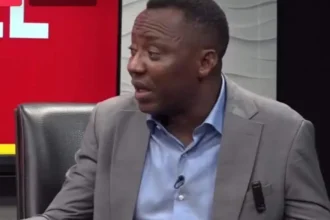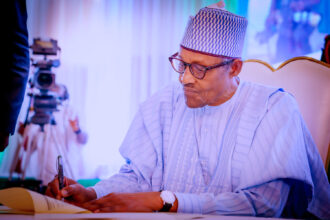...To get all news updates, Join our WhatsApp Group (Click Here)
Also Join our WhatsApp Channel (Click Here)
Udom Idongesit, a prosecution witness in the case of an alleged N1.4 billion money laundering involving Paul Usoro, President, Nigerian Bar Association, NBA, on Wednesday, December 4, 2019, told Justice Rilwan Aikawa of the Federal High Court sitting in Ikoyi, Lagos how a sum of N700 million was paid into Usoro’s account on the instruction of Linus Nkan, a former Accountant-General, Akwa Ibom State.
Usoro was first arraigned before Justice Muslim Hassan of the same court on December 18, 2018.He was later re-arraigned on Friday, March 1, 2019 before Justice Aikawa on a 10- count charge.
One of the counts reads: “That you, Paul Usoro, SAN, Emmanuel Udom (currently constitutionally immune against criminal prosecution), Uwemedimo Thomas Nwoko (still at large), Nsikan Linus Nkan, Commissioner of Finance, Akwa Ibom State (still at large), Mfon Jacobson Udomah, Accountant-General, Akwa Ibom State (still at large) and Margaret Thompson Ukpe (still at large) sometime in 2015 in Nigeria, within the jurisdiction of this Honourable court, conspired amongst yourselves to commit an offence, to wit: conversion of the sum of N1. 410, 000, 000, 000.00 (One Billion, Four Hundred and Ten Million Naira), property of the Government of Akwa Ibom State of Nigeria, which sum you reasonably ought to have known forms part of the proceeds of an unlawful activity to wit: criminal breach of trust and thereby committed an offence contrary to Section 18(a) of the Money Laundering (Prohibition) Act, 2011 as amended and punishable under Section 15(3) of the same Act.”
At today’s sitting, Idongesit, a Relations Manager at the Aka Road branch of Zenith Bank in Uyo, Akwa Ibom State, told the court that the bank, on March 10, 2016, was given a withdrawal instrument of N700m on the imprest account of the Akwa Ibom State payable to Usoro’s Zenith Bank account.
Led in evidence by the prosecution counsel, Rotimi Oyedepo, the witness further said she made moves to get Usoro to open an account with the bank so that the money could be paid to him.
The witness also told the court that she opened an account for the defendant due to the fact he never had an account with the bank prior to that transaction.
She said she got Usoro’s contact from the Akwa Ibom State Governor, Udom Emmanuel, on March 14, 2016 and later put a call through to him to inform him about the payment.
Giving further testimony, Idongesit said: “Mr. Paul Usoro instructed me to work with two of his colleagues.
“When I confirmed the exact names registered on the form, I sought the approval of my Zonal Head to open the account and also made the deposit while waiting for documentation.
“I filled the deposit slip; and the depositor’s name that I filled was Paul Usoro.”
Idongesit further told the court that a sum of N300 million was first credited to the account on March 14, 2016 in cash and that more funds were subsequently credited to the account to the tune of N400 million.
The transactions, according to her, were carried out on the instructions of the defendant.
Idongesit, in her evidence, also told the court that monies were transferred to individuals and companies from the defendant’s account on his instructions.
“On March 22, 2016, Mr. Paul Usoro instructed me to transfer the sum of N2.5 million to one Assam Ekanem; N7.5 million to Taiwo Oyetibo & Co; N7.5 million to Oyechi Ipeaza; N5 million to Uzuegbu Nelson Aju; N30 million to OEB Offiong and N7.5 million to DD Dodo & Co.
“A transfer of N3million was also made to one Reginald Nwobbi; N2 million to Sevanne Chambers and N20 million to Theophilus Oyesanya,” she also stated.
The witness said there were emails to show and reflect the instructions given to her by the defendant regarding all the transactions.
The emails, instruments of payment, account opening package, certification of identification and statements of account were tendered by the prosecution counsel, Oyedepo, and admitted in evidence by the court.
Justice Aikawa adjourned the case till January 13 and February 11 and 12, 2020 for continuation of trial.
You can get every of our news as soon as they drop on WhatsApp ...To get all news updates, Join our WhatsApp Group (Click Here)
Also Join our WhatsApp Channel (Click Here)












